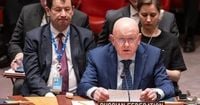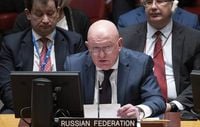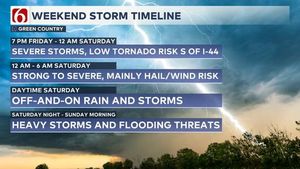The ongoing conflict between Russia and Ukraine has reached a critical juncture as the United States proposes new terms aimed at facilitating a peace agreement. According to a report from Bloomberg, the US is considering easing sanctions against Moscow to create favorable conditions for negotiations between the two nations.
This proposal includes outlining specific terms to end the fighting, with the potential for sanctions to be relaxed in the event of a long-term ceasefire. However, the plan also suggests maintaining the status quo, effectively freezing the conflict, which would leave Russian-occupied territories under Moscow's control and prevent Ukraine from joining NATO.
The discussions surrounding this proposal took place during meetings in Paris, where US Secretary of State Marco Rubio met with French President Emmanuel Macron and US envoy Steve Witkoff. These negotiations included input from national security advisors from France, Germany, the UK, and Ukraine, indicating a collaborative effort to address the ongoing crisis.
Rubio has expressed concern over the lack of progress in peace efforts, suggesting that the US may withdraw from its involvement if tangible advancements are not achieved. He stated, "The US government may withdraw from peace efforts without progress," highlighting the urgency of the situation.
In response to these developments, Vasily Nebenzya, Russia's Permanent Representative to the United Nations, commented on the potential for a ceasefire resolution. He noted that while a US-initiated ceasefire resolution has already been passed, the success of any ceasefire will depend on the specific terms and language of the agreement. Nebenzya remarked, "A ceasefire is currently unrealistic because Ukraine has not respected the cessation of attacks on energy infrastructure for 30 days." This statement underscores the complexities involved in reaching a peaceful resolution.
Moreover, Kremlin spokesman Dmitry Peskov announced that the US-initiated cessation of attacks on energy infrastructure has expired, and President Vladimir Putin has not issued any new directives regarding the conflict. This lack of new orders could further complicate the situation, as both sides grapple with the implications of the ongoing hostilities.
In February 2025, the UN Security Council adopted a resolution proposed by the US concerning the Russia-Ukraine crisis. This resolution expressed sympathy for the victims of the conflict and emphasized the UN's role in maintaining international peace and security. The document called for an immediate end to the conflict and the establishment of a lasting peace between Ukraine and Russia.
Despite the progress indicated by both the US and Russia, the path to a peaceful resolution remains fraught with challenges. The Kremlin has acknowledged that while some progress has been made, "there are still many complex discussions ahead." This statement reflects the ongoing difficulties in negotiating a ceasefire and the need for continued dialogue.
As the situation evolves, it remains to be seen whether the proposed US plan will gain traction among the involved parties. The international community is closely monitoring developments, as any resolution to the conflict could have significant implications for regional stability and global geopolitics.
In summary, the US's recent proposal to ease sanctions and outline terms for a ceasefire presents both opportunities and challenges. While there is a clear desire for peace, the realities on the ground and the differing positions of the parties involved complicate the path forward. As negotiations continue, the hope for a diplomatic resolution remains, albeit with significant hurdles still to overcome.






